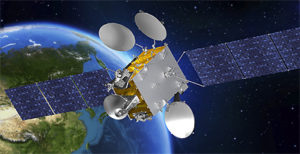
Bangladesh’s first satellite, the Bangabandhu-1 communications satellite, is set to be launched on board a SpaceX Falcon-9 space launch vehicle from Cape Canaveral, Florida, on 4 May 2018, according to Mohammed Mezbahuzzaman, project director of the satellite programme.
Bangabandhu-1 was originally supposed to be launched from Florida in December 2017 but was postponed due to the widespread impact of Hurricane Irma at the time, combined with an exceptionally crowded SpaceX launch schedule. Weather and other conditions permitting, SpaceX will launch Bangabandhu-1 on the new date in May at a time that has yet to be announced.
The Bangabandhu-1 satellite was built by Thales Alenia Space in France, and then flown by a specialised aircraft to SpaceX facilities at Cape Canaveral where the satellite has undergone pre-launch testing and preparations by engineers.
“Our satellite will say BB on the side and bear a government logo,” Mezbahuzzaman told bdnews24.com in an interview on 15 April 2018.
“The 7-metric tonne satellite will travel up to 36,000 km from the launch pad before making adjustments for orbit,” Mezbahuzzaman said. “Preparations for the launch have already begun.”
According to Mezbahuzzaman, the launch of the satellite will likely take 30 days to reach its position in geostationary orbit (GEO) at 119.1 degrees East. Once active Bangabandhu-1 will be under the control of stations in the United States, Italy, and South Korea, and then once operational it will be controlled by ground stations in Joydebpur and Betbunia in Bangladesh.
Bangladeshi officials have said that Bangabandhu-1’s Ku-band beams will cover Bangladesh and its territorial water bodies of the Bay of Bengal, India, Pakistan, Nepal, Bhutan, Sri Lanka, Indonesia, and the Philippines. C-band beams will cover Bangladesh, India, Indonesia, the Philippines, Myanmar, Bhutan, Nepal, Sri Lanka, Afghanistan, Pakistan, Tajikistan, Kyrgyzstan, Uzbekistan, Turkmenistan, and portions of Kazakhstan.
The Bangabandhu-1 satellite will offer video services for Direct-to-Home (DTH) television, e-learning, tele-medicine, family planning, and farming; voice services to cellular backhaul and disaster recovery; and data service for Internet, SCADA, SOHO, as well as business-to-business services, such as Very Small Aperture Terminal (VSAT).





